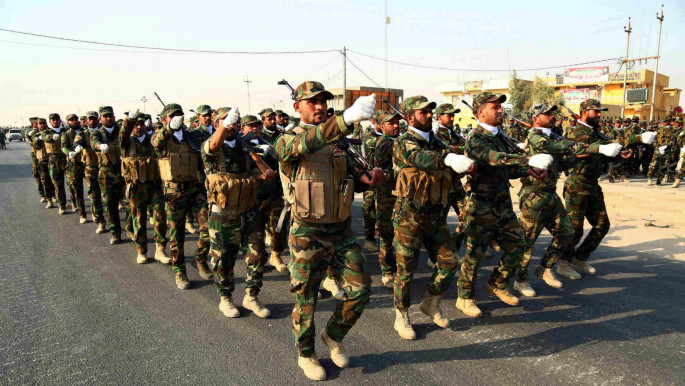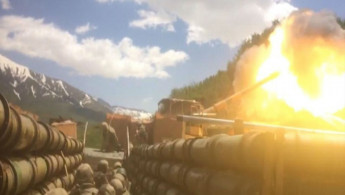The Iraq Report: Joint Turkey-Iran offensive against Iraq's Kurds commences
In what has received very little media attention, Turkey has launched its first ground and air operation jointly with Iranian support against fighters of the Kurdistan Workers' Party (PKK) who are based in Iraq's northern mountains.
This assault, while significant primarily due to the cooperation between Turkey and Iran, is nevertheless unlikely to terminate the PKK threat to Turkey emanating from Iraq.
Read also: Can Iraq finally realise its potential for tourism?
Meanwhile, Iraqi Kurdish factions have finally elected Nechirvan Barzani as the new president of the Kurdistan Regional Government (KRG). However, his ascension to power from his previous post of prime minister is not without controversy, leading to criticism and divisions as rivals the Patriotic Union of Kurdistan (PUK) party appear close to walking away from a power-sharing agreement with Barzani's Kurdistan Democratic Party (KDP).
Further south, powerful Shia clerics have mobilised thousands of their supporters to demonstrate against rising hostilities between the United States and Iran. Considering their prior involvement in the sectarian civil strife and the death squads targeting Sunni Iraqis, their motivations appear to be more pragmatic than due to pacifism.
Turkey and Iran join forces against PKK
The Turkish defence ministry announced on Monday that it had launched an aerial and ground assault against PKK militants hiding out in Iraq's northern mountain ranges.
Codenamed Operation Claw, Turkish forces launched an offensive against PKK positions in the Hakurk mountainous region near Iraq's border with Iran.
PKK militants and their commanders have used Iraq's Qandil mountains as a base of operations for decades.
|
Due to the treacherous terrain, Turkish military operations have tended to focus on airstrikes rather than risk ground forces being ambushed in the mountains by PKK fighters who are trained and adapted to fighting in the terrain.
However, this time Turkish special forces have taken part, with the Turkish defence ministry tweeting several photographs showing commandos engaged in combat operations in the Hakurk region.
"The number of terrorists neutralised so far as part of the operation has risen to 19," the defence ministry said in a statement on Thursday, adding that airstrikes had also destroyed ammunition and arms depots, shelters, and weapon emplacements.
The Turkish government uses the term "neutralised" to suggest a target was either captured or killed.
The PKK is blacklisted as a terrorist organisation by Turkey, the European Union, and the United States. However, Turkey has often been at loggerheads with the US over its support for the PKK's sister organisation the People's Protection Units, or YPG, in Syria.
While Turkish operations against the PKK and YPG are nothing new – having launched two operations in 2016 and 2018 in Syria – what is interesting is that Iran is actively assisting the Turkish military on this occasion.
Whereas previous Turkish raids on PKK positions on northern Iraq meant that Kurdish militants could simply cross the Iranian border to avoid the airstrikes and come back once they were over, this time it would appear that Tehran is actively helping to box the fighters onto Iraqi territory.
Iran's assistance to Turkey is likely linked to the fact that it is currently busy going on an international charm offensive to shore up support after its economy took a precipitous nosedive following the reinstatement of US sanctions last year. Turkey is a key trading partner with Iran.
Iraq's silence on the operation, both from elites in Baghdad and Erbil, suggests Iranian influence at play to allow Turkey to satisfy its perceived security desires with minimal interference. Previously, Baghdad had complained that a Turkish military presence in Iraq was a breach of its sovereignty.
 |
|
| Read also: The Iraq Report: Iraq finds itself between the competing interests of US and Iran |
While the offensive is too small in scale to yield long-term results and halt PKK activities in Turkey, it still demonstrates how Iraq is incapable of preventing actors such as the PKK from attacking its neighbours. Iraq is similarly incapable of preventing its neighbours from launching military operations on its territory, such as Operation Claw.
Divisions as new Kurdistan president inaugurated
Iraq's self-governing Kurdish region has elected a new president in a parliamentary vote boycotted by a key rival.
Nechirvan Barzani, the nephew of former president Masoud Barzani, was elected by 68 Kurdish MPs amid a boycott by the Patriotic Union of Kurdistan.
Former prime minister Nechirvan Barzani will follow his uncle Masoud Barzani in office. The elder Barzani, who was the only person to ever hold the office of president, resigned in November 2017 after a failed bid for independence from Iraq. The presidency has been vacant since.
Nechirvan won 68 votes from the 81 members present in the 111-seat Kurdish parliament. He was born in northern Iraq in 1966 but spent part of his life in Iran and speaks fluent Kurdish, Farsi and English.
His four rivals for the office received no votes.
Still, the KDP's Barzani will face opposition as the PUK and New Generation – a fledgling party – both boycotted the vote despite the support of opposition party Gorran, as well as minority Turkmens and Assyrians.
Some of the criticism levelled at Barzani is that he appears to be inheriting his uncle who dominated Kurdish politics alongside the late PUK leader Jalal Talabani for decades. While the elder Barzani became KRG president after the fall of Saddam Hussein in 2003, Talabani succeeded Saddam as president of Iraq.
Nechirvan Barzani was also not elected by popular vote but by agreement of a simple majority of MPs. In other words, 81 out of 111 parliamentarians decided who should rule over millions of Kurds, causing some degree of consternation.
The PUK – who have ruled alongside the KDP in a power sharing agreement – have been suffering from intraparty conflict since the death of Talabani in late 2017. While they initially agreed that Barzani could become president in exchange for a joint candidate as governor of the oil-rich Kirkuk governorate coveted by the Kurds, they apparently changed their minds at the eleventh hour and put forward three alternate candidates, causing their deal with the KDP to go into a tailspin.
The PUK's decision to put forward a number of other candidates comes down to internal power struggles, though it seems that Qubad Talabani – the late Jalal Talabani's son – will retain his position of deputy prime minister in the coalition government due to his reported good relations with the Barzanis.
Shia leaders fear outbreak of US-Iran war
As Iran and the United States continue to escalate their war of words against one another, powerful Shia clerics, political leaders, and militant commanders who run sway in the federal capital Baghdad are behaving skittishly, fearing an outbreak of direct hostilities between the two powers.
Muqtada al-Sadr, the cleric whose bloc won the most votes at last year's elections, called upon his followers to hold a mass demonstration last Friday in the capital's Tahrir Square. More than 3,000 Sadrists heeded the call chanting "no to war" and "yes to peace".
Sadr had previously said that any political party who would drag Iraq into a war between the US and Iran "would be the enemy of the Iraqi people."
 |
Sadr had previously said that any political party who would drag Iraq into a war between the US and Iran 'would be the enemy of the Iraqi people' |  |
Days later, Iraqi Foreign Minister Mohammed al-Hakim met with his Iranian counterpart, Mohammed Javad Zarif, and offered to mediate the crisis between Washington and Tehran.
"We are going to try to be mediators," said al-Hakim at a joint presser with Zarif on Sunday in Baghdad.
Shia-majority Iraq has been trying to maintain a fine line as allies Tehran and Washington descended into verbal vitriol in May. The country also lies on the fault line between Shia Iran and the mostly Sunni Arab world, particularly powerhouse Saudi Arabia, and has long been a battlefield in which rivalries for regional supremacy played out.
The mediation offer by al-Hakim echoed one made Saturday by Mohammed al-Halbousi, the Iraqi parliament speaker. Al-Hakim also expressed concern for Iran's spiralling economy.
Iranians make up the bulk of millions of Shia from around the world who come to Iraq every year to visit its many shrines and holy sites, and their purchasing power has slumped considerably since US President Donald Trump re-imposed sanctions.
Nevertheless, and despite offering to mediate, Iraq has made it quite clear as to whose side they are clearly on.
"The sanctions against sisterly Iran are ineffective and we stand by its side [in this dispute]," al-Hakim said, standing alongside Zarif.
Arguably, Iraqi Shia leaders fear an outbreak of war between their patrons Iran and the facilitators of their rise to power in 2003, the United States, primarily due to the disparate power dynamics between the two actors.
If Iran is attacked, it will activate its Iraqi proxies who are not only militias but also part and parcel of the Iraqi state, including within the military and federal police. This would make them targets for American reprisals, leading to their overall diminishing power in Iraq. It would also force Washington to look elsewhere for allies in Iraq, perhaps in corners that have been long marginalised and persecuted by the authorities in the Green Zone.
Such an outcome would be catastrophic to Iraq's current political process, a process that was boycotted by more than half of eligible Iraqi voters last year which demonstrates its inherent weakness and instability.



